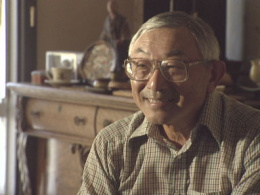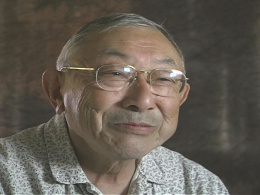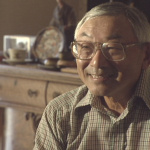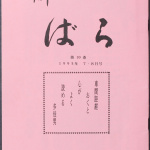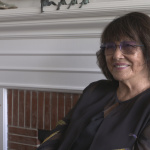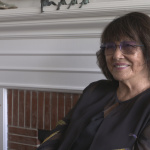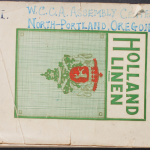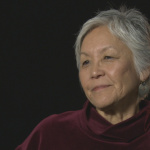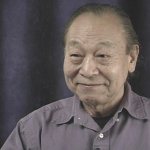Hiroshi Kashiwagi
| Name | Hiroshi Kashiwagi |
|---|---|
| Born | November 8 1922 |
| Died | October 29 2019 |
| Birth Location | Sacramento, CA |
| Generational Identifier |
Hiroshi Kashiwagi (1922–2019) was a poet, playwright, memoirist, and actor. His first book Swimming in the American: a Memoir and Selected Writings, was awarded the American Book Award 2005 by the Before Columbus Foundation. Kashiwagi was also a retired librarian of the San Francisco Public Library and a member of the Dramatists Guild and the Screen Actors Guild.
World War II Incarceration and the Loss/Restoration of U.S. Citizenship
Kashiwagi was born on November 8, 1922, in a boarding house in Sacramento, California, and spent his childhood with a younger brother and sister in Loomis, a small agricultural town in Placer County, where his parents ran a fish market. Soon after graduating from high school in Los Angeles, Kashiwagi was incarcerated in Tule Lake concentration camp with his mother and siblings; his father was hospitalized with tuberculosis and never entered camp. Restless and bored, he spent the majority of his time at Tule Lake reading, smoking, and playing cards before he joined a theater group and began to act and write. When the U.S. government requested camp inmates to fill out what was believed to be a compulsory Leave Clearance Application Form, commonly known as the " loyalty questionnaire " Kashiwagi and his family refused to complete the forms. As a result, they were segregated by the government as "disloyals" and ostracized by their community. Since their father was still hospitalized outside the War Relocation Authority camps, the family never requested repatriation, yet they became dangerously close to being deported to Japan. Through government coercion and intimidations, Kashiwagi renounced his American citizenship, but with the help of American Civil Liberties Union attorney Wayne M. Collins , his citizenship was restored in 1959, a process that took nearly twenty years. Collins' reputation as a man of tenacious courage and intellect has had a lasting legacy, as he fought to restore citizenship for nearly 5,000 Japanese American plaintiffs. (See renunciation of citizenship .)
Postwar Literary and Acting Career
With his case to restore his U.S. citizenship in motion, in 1946 Kashiwagi was released from Tule Lake Segregation Center and returned to Loomis. After working as a farm laborer for two years he enrolled at Los Angeles City College with an English major. In 1949, he wrote his first play for the Nisei Experimental Group, a Japanese American theater group in Los Angeles that he founded with Hirotaka Okubo. Kashiwagi eventually graduated from the University of California, Los Angeles, in 1952 with a B.A. degree in Oriental Languages. He then enrolled at the University of California, Berkeley, as a graduate student in art history and began to pursue his hopes of becoming an actor for stage and screen, by writing another play, a one-act titled "Laughter and False Teeth," and acting in several productions. He was also elected to the Mask and Dagger, an honorary drama society on campus. "Laughter and False Teeth" was first produced in 1954 that is likely the first produced play set in the Japanese American concentration camps. The play was later revived by Asian American theater companies in San Francisco and Los Angeles.
In 1957 he married Sadako Nimura and they have three sons. In order to support his family, Kashiwagi worked at the Buddhist headquarters in San Francisco for eight years as a translator and interpreter, English secretary and editor of the American Buddhist before returning to school to earn a master's degree in library science at UC Berkeley. In 1966, he became one of few minority librarians in the San Francisco Public Library system. Over his twenty year career, he worked as a reference librarian in literature, Japanese language materials, science and government documents, and as a branch manager. At the Western Addition branch he began what is now the largest collection of Japanese language books on the West Coast, before retiring in 1987. In June 2010, a plaque was placed by the San Francisco Public Library Commission at the Western Addition Branch recognizing his work as a librarian.
When the Commission on Wartime Relocation and Internment of Civilians was formed to investigate the reasons for the WWII mass incarceration of the Japanese Americans, Hiroshi Kashiwagi testified at a public hearing in San Francisco in 1981, part of the long legal process which eventually led to an official government apology to Japanese Americans and redress payments in 1988. (See Redress Movement .) Continuing his search to understand and question his experiences during and after the war in which he was unjustly treated, even by his own community, he joined other camp survivors to initiate the Tule Lake Pilgrimage, an intergenerational educational trip to the former Tule Lake concentration camp. Kashiwagi's dedication to the Tule Lake Pilgrimage has earned him the unofficial title of the "Poet Laureate of Tule Lake." (See Camp Pilgrimages .)
At the age of 64, his acting career was revived when he co-starred with Nobu McCarthy in Philip Kan Gotanda 's play, The Wash, at the Eureka Theater in San Francisco. As an actor, Kashiwagi has appeared in such films as Black Rain , directed by Ridley Scott; Hito Hata: Raise the Banner, produced by Visual Communications; Dark Circle; and Hot Summer Winds , and Rabbit in the Moon, both by Emiko Omori. His stage acting credits with the Asian American Theater Company in San Francisco include And The Soul Shall Dance by Wakako Yamauchi and Zatoichi Superstar by Warren Kubota. He continues to perform both on stage and film to this day.
In 2009, Grateful Crane Ensemble received a grant from the California Civil Liberties Public Education Program to produce Kashiwagi's play, The Betrayed , in Los Angeles. Other performances were held at Torrance Art Center, Orange County Buddhist Temple, and at the Minidoka camp reunion at Twin Falls, Idaho.
In 2011, Kashiwagi received an official invitation to "An Evening of Poetry & Prose," from U.S. President Barack Obama and First Lady Michelle Obama, which was held on May 11 in the East Wing of the White House.
Kashiwagi died on October 29, 2019 at the age of 96.
Plays:
The Plums Can Wait (1949), Laughter and False Teeth (1953), Kisa Gotami, a Buddhist parable (1955), Mondai wa Akira (The Problem is Akira), a bilingual play (1956), Blessed Be (1977), Window for Aya (1979), The Betrayed (1993).
Books:
Starting from Loomis and Other Stories (2013), Swimming in the American, a Memoir and Selected Writings (2005), Shoe Box Plays (2008), Ocean Beach, Poems (2008).
For More Information
Fallenbaum, Nina Kahori. "APA Heritage Month Profiles: Hiroshi Kashiwagi, Poet, Playwright, Actor." Hyphen Magazine Issue 24, (2011).
Kashiwagi, Hiroshi. Shoe Box Plays . San Mateo: Asian American Curriculum Project, 2005.
Kashiwagi, Hiroshi. Swimming in the American: A Memoir and Selected Writings. San Mateo: Asian American Curriculum Project, 2005.
---. Starting from Loomis and Other Stories . Edited and with an introduction by Tim Yamamura. Boulder: University Press of Colorado, 2013.
Hiroshi Kashiwagi interviewed by Alex S., Meryl F., with Howard Levin. Oral History Project. The Urban School of San Francisco (high school). May 3, 2005. http://www.tellingstories.org/internment/hkashiwagi/index.html .
Hiroshi Kashiwagi interviewed by Anna W., David M., Frank K., with Zach W. and Howard Levin. Oral History Project. The Urban School of San Francisco (high school). April 27, 2006. http://www.tellingstories.org/internment/hkashiwagi/index.html .
Kashiwagi, Soji. "'The Betrayed'—Why Now Is the Time." Discover Nikkei, February 4, 2010. http://www.discovernikkei.org/en/journal/2010/2/4/the-betrayed/ .
Kashiwagi, Soji. "Hiroshi Kashiwagi Goes to Washington." Discover Nikkei, June 19, 2011. http://www.discovernikkei.org/en/journal/2011/6/19/hiroshi-kashiwagi-washington/ .
Nakao, Annie. "Pioneering Poet, Playwright and Actor Focuses on His Life in His First Book—at Age 82." San Francisco Chronicle , April 26, 2005.
Last updated Oct. 5, 2020, 5:40 p.m..

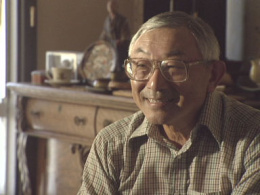 Media
Media
